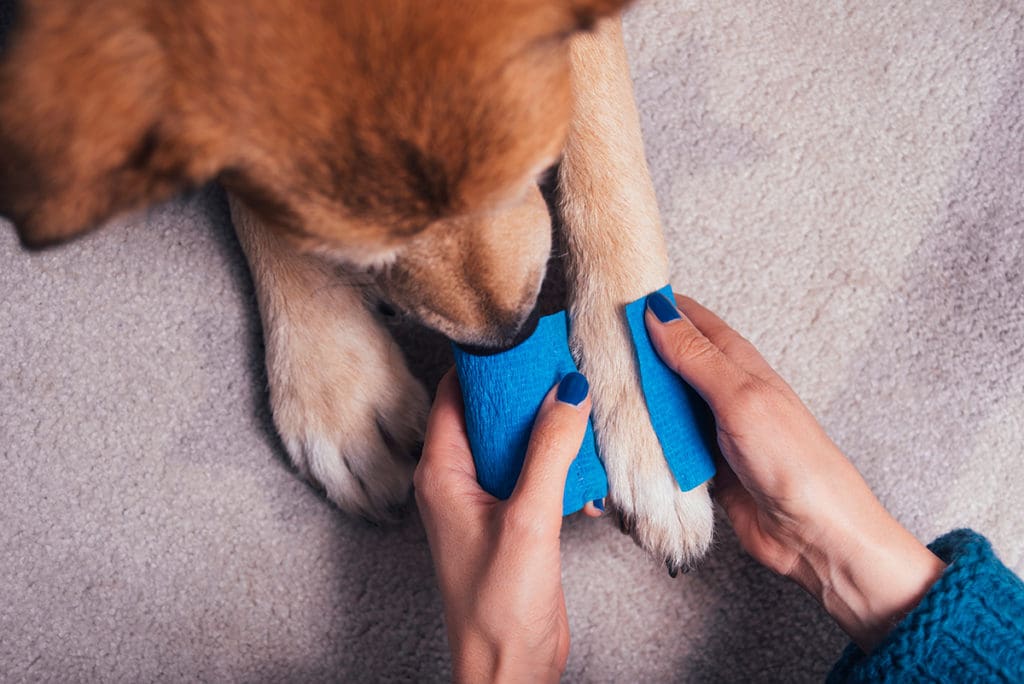First Aid for your dog
If you are concerned about your dog’s health, you should contact a suitably qualified veterinary professional for advice. However, in an emergency it is useful to have a veterinary phone number at hand and be aware of the following tips.

| Allergies | Choking | Heat stroke |
| Bloat | Cuts and grazes | Poisoning |
| Acute diarrhoea or vomiting | Dog bites & scratches | Shock |
| Burns & scalds | Ears, eyes & feet | Stings |
Allergies
Be aware of the products you use in the home. Flea and worm treatments are very important in preventing allergic reactions to parasites.
Symptoms
- Swelling at the site.
- Depression.
- Occasional vomiting and diarrhoea.
- Severe reactions result in shock and may lead to collapse.
Treatment
Mild/moderate allergic reactions:
- Keep the dog as calm as possible.
- If you know what has caused the reaction, remove it from the dog.
- Remove the collar as it may restrict the throat area.
- If possible, gently apply a cold compress to the affected area to reduce inflammation and pain.
- Call a vet if the reaction does not calm after 24hrs or at any stage if the dog’s breathing becomes laboured.
Severe allergic reactions:
- Treat as above.
- Call your vet immediately – this is life threatening.
- Monitor for shock and treat accordingly.
Bloat & gastric torsion
Gastric torsion is caused by a dysfunction of the stomach where food becomes trapped because there is an obstruction of outflow. This results in excess gas build up (bloat) which may cause twisting of the stomach.
Symptoms
- Symptoms are varied, but in general the dog will look uncomfortable and distressed to extremely distressed.
- There may be abdominal distension, hyper salivation, breathing difficulties, retching and weakness may also be seen.
Treatment
- THIS CONDITION IS LIFE THREATENING, THEREFORE YOU SHOULD TAKE YOUR DOG TO THE VET IMMEDIATELY IF YOU SEE THE SYMPTOMS SHOWN ABOVE.
Acute diarrhoea/vomiting
Treatment
If your dog has acute diarrhoea or vomiting:
- For young puppies less than 6 months, contact your vet for advice immediately.
- For puppies or dogs over 6 months, withhold food for 24 hours then give them a light diet e.g. chicken, rice, or scrambled eggs until they return to normal health. To prevent dehydration supply plenty of fresh water and monitor your dog’s behaviour.
- Contact your vet if you have any concerns or see no improvement.
- Make sure your dog is unable to get at any food other than their diet. Wrap up cooked bones and put in outside bins. Make sure the dog cannot get into any bins.
Burns & scalds
Symptoms
A burn is caused by dry heat – through contact with or close proximity to a fire or hot metal for example. A scald is caused by something wet. Such as hot liquids or steam.
In the kitchen, treat your dog as you would a small child. Make sure wires are safe, no pan handles are sticking out and hot drinks are out of the dog’s reach. Accidents caused by an enthusiastic swish of the tail are not uncommon so become ‘wagging tail’ aware.
Treatment
- If a burn occurs cool the burn using copious amounts of cold water (either running water from a tap or immerse the body part in a clean bowl of cold water for at least 10 minutes). Your dog may wish to escape from this, but the time taken to cool the deeper tissues is vital.
- If you cannot get to cold water, use an ice pack to cool the wound.
- If there is any hair or clothing sticking to the wound, do not remove it, call your vet.
Choking
Do not throw sticks for your dog; they can become lodged in the throat or mouth.
If you think your dog is choking:
- Open the mouth carefully with one hand pressing the dog’s lips back over the teeth if possible.
- Open the bottom jaw with the other hand.
- Remove the object with a wooden spoon handle or other similar type of implement; do not let the object fall back into the throat.
- If you cannot see an object and suspect it is further back in the throat, you should take the dog to a vet immediately.
Cuts & grazes
Treatment
- Look to see if there are any other injuries in the area and treat accordingly e.g. bruising.
- It may be necessary to carefully cut away any long hair around the wound using scissors so that it can be monitored and kept clean easily.
- Clean the area with cool, salty water.
- Dry the area gently with a cloth that does not leave fibres behind.
- Keep a check on the wound and continue to treat as above. If you have any concerns consult your vet.
- Only cover the wound if you feel it will prevent any further damage to the area.
- Any penetrating wound may lead to infection and veterinary advice should always be sought in these cases after these initial first aid measures.
- In the event of severe haemorrhage, apply pressure to prevent further bleeding and take your dog to the vet immediately.
Dog bites & scratches
Prevention is always better than cure so, for the safety of yourself as well as your dog, wherever possible, avoid knowingly taking your dog anywhere where confrontation may happen.
Read your own dog’s body language as well as other dogs’ signals.
Ears, eyes & feet
Grass seeds
- Grass seeds can cause problems so avoid running your dog in long grass to prevent grass seeds getting in ears. If your dog does get a seed in the ear, contact your vet.
- Check between the dog’s toes for grass seeds after a walk and carefully remove any seeds.
- Keep checking the area where you are walking – avoid freshly tarmacked paths, places with broken glass, spilt oil etc.
Eye injury
If your dog has an eye injury, contact your vet and do not attempt first aid. Never force the eyelids open if closed and if there is something sticking out, do not pull it out.
Heat stroke
Heat stroke is caused by extreme heat exposure. Sitting in a hot car, excessive exercise or even lying in a sunny spot on a warm day can cause heat stroke.
Treatment
If you suspect your dog may have heat stroke, contact your vet for immediate advice and cool the dog down by offering a cool drink of water and by doing one of the following:
- Place them in a cold bath
- Gently shower them with water from a hose
- Gently pour buckets of cool water over them
- Soak towels in water and place these over the dog
Never leave your dog in a car on a hot day, for even a minute, without full ventilation (e.g. boot and windows wide open), reflective sun screens/sheets, plenty of water and leaving the car in a shady place.
Poisoning
What to do if you suspect poisoning:
Suspected chemical poisoning:
- Contact your vet immediately.
- Assess the area for danger. If it’s too dangerous to enter, don’t do it.
- Make the area safe, if possible, by improving ventilation, e.g. open windows and doors.
- If the area is safe, assess the condition of the dog: look for blood, breakages, burns, check for breathing and move the dog away from the poison. Do not get contaminated yourself; wear gloves and cover skin.
Suspected ingested poisoning:
- Remove the poisonous substance immediately from around the dog but retain it in case the vet needs to identify it.
- Call your vet for advice immediately with information regarding the poison, e.g. what it is and how much the dog has consumed and the status of the dog e.g. vomiting, coughing, unconscious etc.
- Check your dog and monitor their behaviour.
Shock
Shock can be caused by trauma (wounds, burns and broken bones), pain, dehydration, allergic reaction or infection to the body. Shock is potentially life threatening.
Symptoms
Coldness, shaking, shivering, rapid weak pulse, rapid shallow breathing and pale mucous membranes (inside the dog’s lips and gums).
Treatment
- Call your vet immediately.
- Maintain a normal body temperature i.e. if cold: cover with a blanket, if hot: keep them cool.
- Place your dog in a lying position on a blanket to keep them as comfortable as possible, elevate the back legs with a cushion if possible to concentrate the blood to the head.
- If the cause is obvious e.g. severe bleeding, you should treat this as soon as possible to minimise shock, by applying pressure to the site. Seek immediate veterinary assistance.
Stings
Wasp and bee stings are very common in the summer months. If the sting is in the mouth, as often happens, there may be considerable swelling of the tongue, salivation, and distress.
Consult a veterinary surgeon for immediate treatment.
Help support our life-changing work...
Imagine if everyday tasks were so challenging or physically demanding they affected your quality of life. For many people living with a disability of families with a child with autism, that is their reality. Now imagine if a specially trained four-legged friend could restore your, or your family’s, independence.
The demand for our services is high and we can’t help as many people as we would like to without more funding. Please help us continue making life-changing differences for people with disabilities through the power of expertly trained dogs.
Every contribution, whatever size, is important and helps us make a difference.

